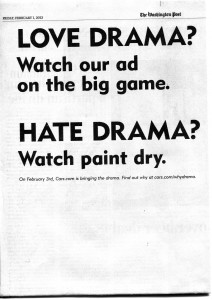Greater than the sum of its parts
Did you watch the 2011 movie New Year’s Eve? If you spent money on it either in the theater or renting it, I am sorry for your loss. I only watched the beginning as it was playing on one of my cable movie channels. After 20 minutes of unbelievable situations and bad lines, I went back to reading the side of the cereal box.
You would be forgiven for thinking that this movie was worth watching. After all, it has a cast of well known (and very attractive) actors (including Michelle Pfeiffer, Hillary Swank, Robert DeNiro, Halle Berry, Ashton Kutcher, Sarah Jessica Parker and even Jon Bon Jovi, to name a few). It is directed by Gary Marshall, who brought us bastions of sitcom TV such as Happy Days and Laverne and Shirley.
But the actors and the director have to follow a screenplay, which in this case was written by Katherine Fugate. Fugate’s credits include the TV series Xena: Warrior Princess. Fugate also wrote Valentine’s Day, another movie that revolves around an over-hyped holiday and which features lots of well known actors (some of the very same ones that appear in New Year’s Eve).
Apparently, Gary Marshall saw potential in a holiday movie franchise. Perhaps we should prepare for St. Patrick’s Day: The Movie, in which a group of well known actors would be anxiously wondering how their romantic lives will survive the drinking of green beer.
Movies are the result of all of the parts working together: acting, directing and writing. You could also throw in cinematography, editing, costume design and sound. As New Year’s Eve painfully underscores, even dozens of well-known actors and a funny-guy director do not make a poorly plotted and written screenplay shine. In other words, a good movie is greater than the sum of its parts.
Communications is much the same way. You have to have more than just pretty, shiny parts that you throw together. To make the movie analogy work here, your communications efforts need good direction (communications strategy), believable acting (execution or tactics) and a well-written screenplay ( your communications plan).
Look at your communications efforts right now. Are you getting led by pretty tactics (Let’s go on Pinterest! Let’s get a blog!) or are you thinking about how everything works together to achieve your goals?
About Deborah Brody
Deborah Brody writes and edits anything related to marketing communications. Most blog posts are written under the influence of caffeine.






